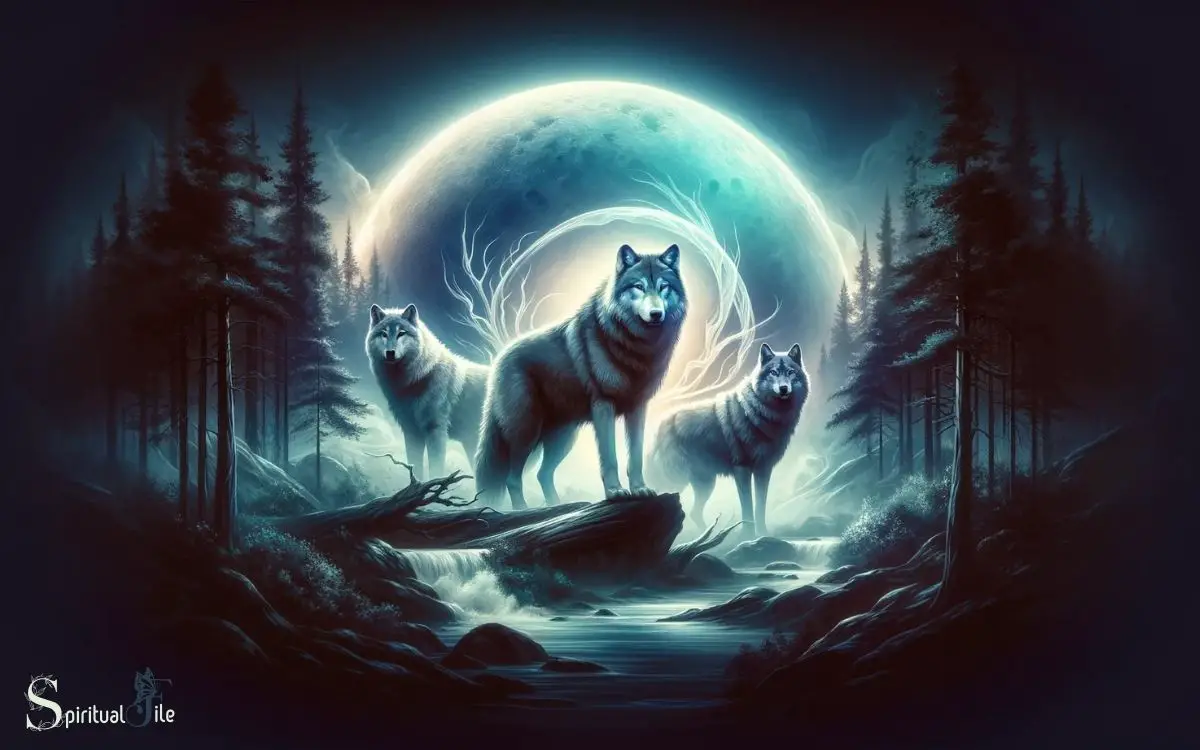What Do Wolves Represent Spiritually: Freedom!
Wolves spiritually represent intelligence, loyalty, freedom, and social connections.
In various cultures and spiritual beliefs, the wolf is a powerful symbol that embodies several attributes. With their strong instincts and pack mentality, they symbolize intelligence, loyalty, community, and freedom.
They also represent the balance between personal power and the need for social connections.
The wolf spirit animal teaches us the importance of familial bonds and working together in a community, while also reminding us to stay in touch with our independent nature.
Embracing the characteristics of the wolf can support personal growth, courage, and deeper connections with those around us.

Key Takeaway
10 Spiritual Representations of Wolves
| Spiritual Representation | Description |
|---|---|
| Strength | Wolves represent strength and resilience, both physical and emotional, as they’re known for their survival skills and ability to thrive in various environments. |
| Loyalty | Wolves are known for their strong pack mentality and unwavering loyalty to their family and group members. This symbolizes the importance of loyalty and trust in relationships. |
| Intelligence | Wolves are often seen as intelligent creatures, using their cunning to hunt and navigate their surroundings. This represents wisdom and problem-solving capabilities. |
| Freedom | As free-roaming animals, wolves symbolize independence and the need to explore and experience life’s adventures. |
| Instinct | Wolves rely heavily on their instincts for survival, representing the importance of trusting oneself and one’s intuition. |
| Balance | Wolves maintain balance in their ecosystems by keeping prey populations in check. This symbolizes the need for harmony and balanced living. |
| Guardian | Wolves are perceived as protective creatures that defend their territory and pack members, embodying the role of guardians, guides, and protectors in spiritual beliefs. |
| Transformation | Wolves play a significant role in many myths and stories involving transformation, such as werewolves and shape-shifters, which signifies personal growth and change. |
| Communication | The intricate communication methods of wolves, including body language, vocalizations, and scent marking, represent the importance of effective communication in life. |
| Family | Wolves are dedicated to their pack and work together to survive, emphasizing the significance of family and community bonds. |
The Spiritual Significance of Wolves
The wolf embodies strength, intuition, and freedom in spiritual symbolism. In many cultures, wolves are revered for their powerful instincts and hunting prowess. They are often seen as guardians of the wild, representing a deep connection to intuition and instinctual knowledge.
Wolves are also symbols of freedom, roaming vast territories and living by their own rules. In spiritual teachings, the wolf’s presence is believed to bring forth a strong sense of independence and the courage to explore the unknown.
Their pack mentality also teaches the importance of community and family bonds. Understanding the spiritual significance of wolves can offer valuable insights into embracing personal strength, trusting one’s instincts, and finding freedom in life’s journey.
Wolves as Spirit Animals
As someone who is intrigued by spiritual symbolism, I find that wolves, as spirit animals, hold a profound significance in many belief systems and cultures. Wolves are often seen as symbols of intuition, freedom, and the wild spirit.
As a spirit animal, the wolf represents the ability to trust instincts and to rely on intelligence and resourcefulness. Many people believe that when a wolf appears as a spirit animal, it is a message to trust in one’s instincts and to be more aware of the social connections in one’s life.
Wolves are also associated with strong instincts, intelligence, and the desire for freedom. They serve as a reminder to listen to one’s inner voice and to be guided by one’s intuition in facing life’s challenges.
Guardians of the Wild
Guardians of the wild, wolves possess a natural grace and strength that commands respect and admiration. Their role as protectors of the ecosystems they inhabit is crucial for maintaining the balance of nature.
Here’s a closer look at some of the ways wolves serve as guardians of the wild:
| Guardians of the Wild | Description |
|---|---|
| Ecosystem Balance | Wolves play a vital role in regulating prey populations, preventing overgrazing, and maintaining the health of plant species. |
| Territory Protection | They defend their territory from intruders, helping to prevent the over-exploitation of resources within their home range. |
| Apex Predator Status | As apex predators, wolves help control the populations of other species, thereby preventing ecological imbalances. |
| Keystone Species | By influencing the behavior of prey species, wolves contribute to the overall health and diversity of their ecosystems. |
| Conservation Efforts | Their presence helps draw attention to the importance of preserving wilderness areas and protecting biodiversity. |
Symbolism of Instinct
As we explore the symbolism of instinct in wolves, it’s fascinating to consider their animal intuition and guidance. Wolves possess a deep primal wisdom that allows them to navigate the wild with remarkable prowess.
Trusting their inner instincts for survival, they serve as a powerful reminder for us to rely on our own intuition in navigating life’s challenges.
Animal Intuition and Guidance
In my experience, wolves symbolize an instinctual connection to intuition and guidance, representing the primal wisdom inherent in the natural world. Wolves’ keen senses and ability to navigate through various terrains speak to their intuitive nature.
The following table illustrates the symbolism of animal intuition and guidance:
| Animal Intuition and Guidance | Symbolism |
|---|---|
| Keen senses | Heightened awareness and perception |
| Navigating through terrains | Adapting to life’s challenges |
| Pack dynamics | Cooperation and mutual support |
| Howling | Communicating and connecting with others |
Wolves teach us to trust our instincts, listen to our inner voice, and seek guidance from the natural world.
This deep connection to intuition allows us to navigate life’s complexities with grace and wisdom, reflecting the deep primal wisdom inherent in wolves.
Deep Primal Wisdom
I’ve found that wolves symbolize a profound instinctual wisdom, reflecting the primal knowledge inherent in the natural world. Their deep primal wisdom serves as a powerful reminder of the importance of tapping into our instincts and intuition.
Wolves embody the idea of trusting our inner guidance, as they rely on their acute senses and instincts to navigate their surroundings. This symbolism encourages us to reconnect with our own primal instincts, reminding us to listen to our inner voice and trust our gut feelings.
By embracing this deep primal wisdom, we can gain a greater understanding of ourselves and the world around us. Wolves serve as a spiritual guide, urging us to embrace our intuition and tap into the profound wisdom that resides within us.
Trusting Inner Instincts
My first instinct tells me that the symbolism of wolves lies in their acute instincts, guiding them through their environment with unparalleled precision.
Wolves represent the importance of trusting our inner instincts, and their symbolism can teach us valuable lessons about the power of intuition.
Here’s why trusting inner instincts is a crucial aspect of the wolf’s spiritual representation:
- Survival: Wolves rely on their instincts for survival, showcasing the significance of trusting our inner guidance for navigating life’s challenges.
- Connection to Nature: Wolves’ instincts are deeply connected to the natural world, reminding us to listen to our intuition and stay attuned to our surroundings.
- Decision-Making: Wolves’ keen instincts aid in decision-making, highlighting the importance of trusting our gut feelings when making choices.
- Spiritual Guidance: The wolf’s instinctual nature serves as a symbol of spiritual guidance, encouraging us to trust our inner wisdom for spiritual growth and understanding.
Wolves as Agents of Transformation
Wolves symbolize transformation, embodying the power of change and growth in the spiritual realm. In my personal journey, I’ve come to see wolves as agents of transformation, guiding us through the process of inner evolution.
They teach us about the cyclical nature of life, where death and rebirth are intertwined. Just as wolves undergo physical and behavioral changes to adapt to their environment, they inspire us to embrace our own evolution.
By observing their pack dynamics, we learn about leadership, cooperation, and the importance of community in our own transformative processes. Their howls echo the call for us to awaken to our true selves and shed old ways of being.
Ultimately, wolves serve as a spiritual reminder that transformation is a natural and necessary part of our existence.
Wolves in Mythology and Folklore
In my exploration of the spiritual significance of wolves, I have discovered that they hold a prominent place in mythology and folklore. Wolves feature in various cultural myths and folktales, often symbolizing different qualities and attributes.
Here are some intriguing aspects of wolves in mythology and folklore:
- Guardians: In many cultures, wolves are seen as guardians and protectors, watching over people and guiding them through the spiritual realm.
- Shapeshifting: Wolves are often associated with shapeshifting abilities, appearing as both humans and wolves, blurring the lines between the human and animal worlds.
- Symbol of Power: In some folklore, wolves represent strength, endurance, and primal instincts, serving as a symbol of power and ferocity.
- Spiritual Teachers: Wolves are revered as spiritual teachers, imparting wisdom and knowledge to those who are attuned to their messages.
The Spiritual Connection to Nature
As an individual seeking spiritual understanding, I find that connecting with nature deeply enriches my spiritual journey. Nature has a way of grounding me and helping me feel connected to something greater than myself.
When I immerse myself in the natural world, whether it’s through a walk in the woods, sitting by a river, or simply observing the stars, I feel a sense of peace and harmony that transcends the mundane aspects of everyday life.
The spiritual connection to nature allows me to tap into a primal energy that is both soothing and invigorating.
It’s in these moments that I feel most in tune with the universe and gain a deeper understanding of the interconnectedness of all living things. Embracing the wild within is an essential part of this journey.
Do Wolves and Goats Both Symbolize Spiritual Freedom?
Wolves are often associated with independence and intuition, while goats symbolize spiritual curiosity. In various cultures, both animals represent the quest for spiritual freedom and the willingness to explore the unknown. Whether it’s the wolf’s instinct or the goat’s curiosity, they both embody a yearning for spiritual enlightenment.
Embracing the Wild Within
Embracing my connection to the untamed aspects of nature has been a transformative and enlightening experience. It has allowed me to tap into the primal energy that resides within each of us and to embrace the wildness that is part of our human nature.
Here are four key aspects of embracing the wild within:
- Self-Exploration: Embracing the wild within enables us to explore our own untamed instincts and desires, leading to a deeper understanding of ourselves.
- Freedom: It allows us to break free from societal constraints and expectations, encouraging us to live authentically and in harmony with our instincts.
- Strength: Embracing the wild within teaches us to harness our inner strength and resilience, enabling us to navigate life’s challenges with courage and determination.
- Connection: It fosters a deep connection to the natural world, reminding us that we are part of a larger, untamed ecosystem.
Conclusion
Wolves hold deep spiritual significance as symbols of instinct, transformation, and the wild. While some may see them as symbols of danger and fear, their role as guardians of the wild and their connection to nature remind us to embrace the wild within ourselves.
By understanding and honoring the spiritual significance of wolves, we can gain a greater appreciation for the natural world and our own instincts.






